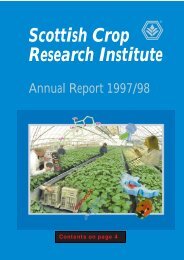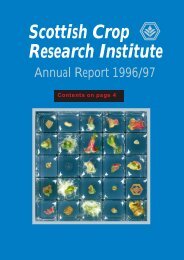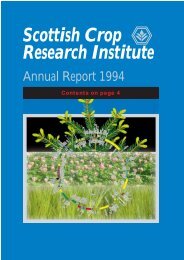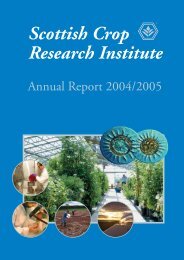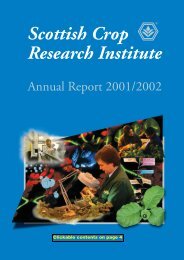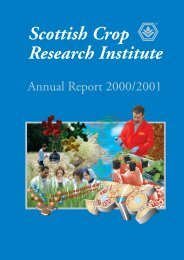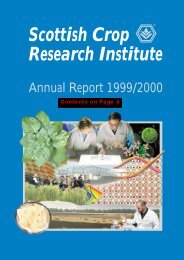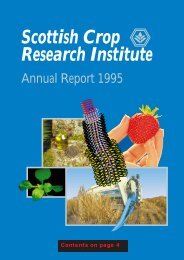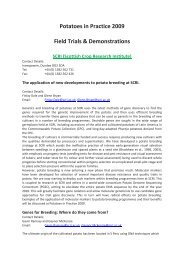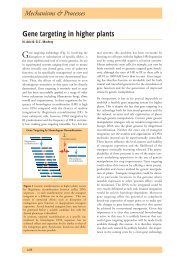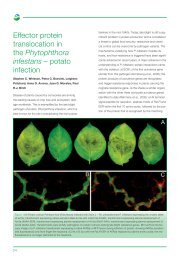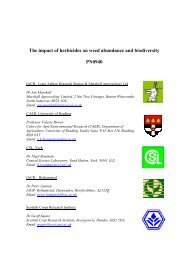PDF file: Annual Report 2002/2003 - Scottish Crop Research Institute
PDF file: Annual Report 2002/2003 - Scottish Crop Research Institute
PDF file: Annual Report 2002/2003 - Scottish Crop Research Institute
Create successful ePaper yourself
Turn your PDF publications into a flip-book with our unique Google optimized e-Paper software.
Genes to Products<br />
H.V. Davies, R. Viola & R. Waugh<br />
‘Genes to Products’ aims to harness the combined power of genomics, contemporary genetics,<br />
biochemistry and natural product chemistry to deliver products to market places becoming increasingly<br />
sophisticated and competitive. Breeding is seen as a crucial platform for product development but the<br />
delivery of high quality, relevant science, is also key to the vision as is the continued development of<br />
truly interdisciplinary approaches in problem solving activities. Activities in this Theme will be closely<br />
integrated with the development of newly established Product Innovation Centres (PIC) for SCRI’s<br />
major commodity crops: potato, fruit and grains, each driven by a lead scientist. The PIC falls under<br />
the umbrella of Mylnefield <strong>Research</strong> Services (MRS).<br />
The Genes to Products Theme has two research programmes,<br />
Quality, Health & Nutrition (QHN) and<br />
Genome Dynamics (GD).<br />
Quality, Health & Nutrition: The goal of the QHN<br />
Programme is to implement strategies to improve the<br />
quality and nutritional value of raw materials entering<br />
the food chain. Traditionally, crops have been bred<br />
for high yield and disease resistance. The programme<br />
focuses on phytochemicals, which have potentially<br />
important roles in human health and on the identification<br />
of compounds and processes, which contribute<br />
to the flavour and textural properties of food materials.<br />
Metabolite profiling has been developed as an<br />
underpinning platform technology and is being<br />
deployed to assess phytochemical diversity and to<br />
unravel the metabolic networks that regulate the<br />
development of key traits. The utility of the technology<br />
in the detection of unintended effects in GM<br />
crops is also being addressed within the framework of<br />
national and European consortia.<br />
<strong>Research</strong> on antioxidants and bioactive molecules<br />
focuses on phenolic antioxidants, L-ascorbic acid and<br />
carotenoids using a range of phytochemical, biochemical<br />
and molecular approaches. In vitro digestion<br />
studies have shown that fruit anthocyanins are subject<br />
to non-specific absorption e.g. on to bile acids and<br />
undergo chemical hydrolysis during digestion (and<br />
prior to absorption). Significantly, chemical transformations<br />
of phenols to ortho-phenolic acids (aspirin<br />
analogues) have been detected with substantial biological<br />
implications for human health given that aspirin<br />
is the leading drug recommended to retard the development<br />
of cardiovascular disease. <strong>Research</strong> on L-<br />
ascorbic acid has focused on the plant biosynthetic<br />
pathway and turnover in storage organs. In addition,<br />
long-distance transport of L-ascorbic acid in crop<br />
plants has been demonstrated and novel approaches<br />
for the cloning of plant L-ascorbic acid transporters<br />
developed. Carotenogenesis in potato has been characterised<br />
in detail, focusing on transcriptional changes<br />
in genes that encode the major carotenoid biosynthet-<br />
106



